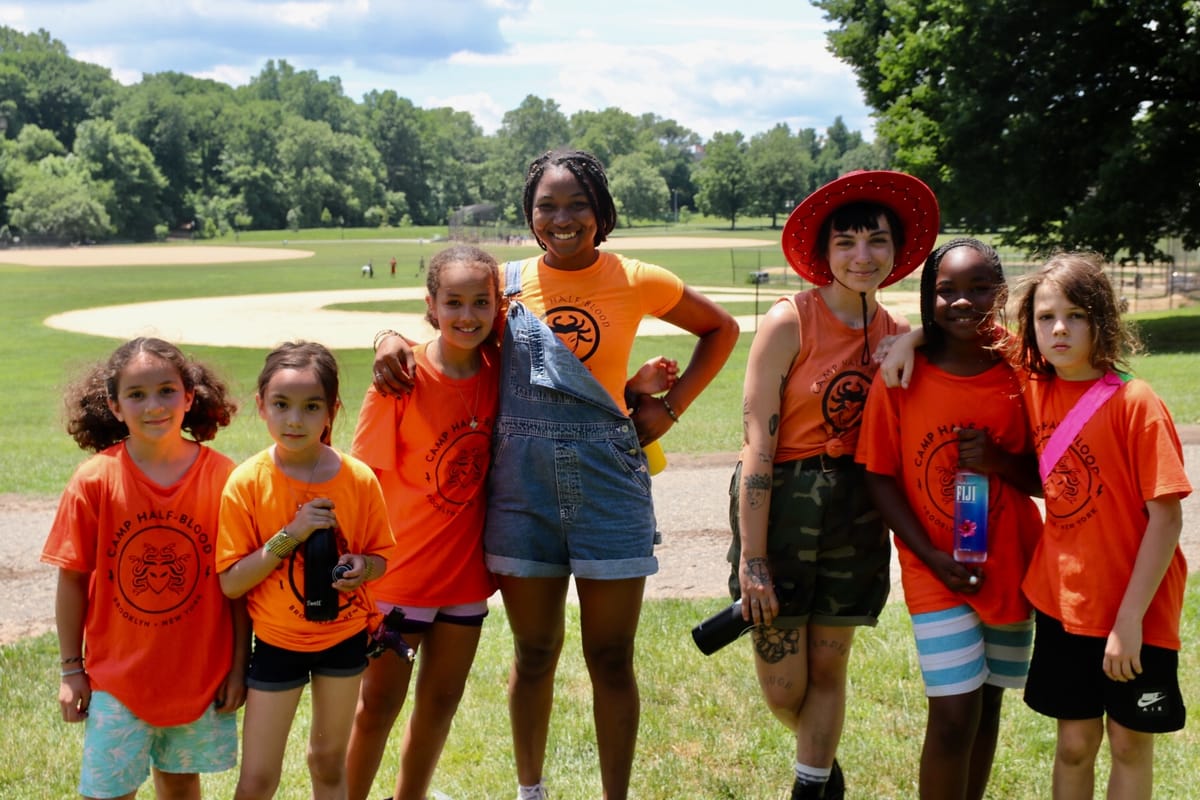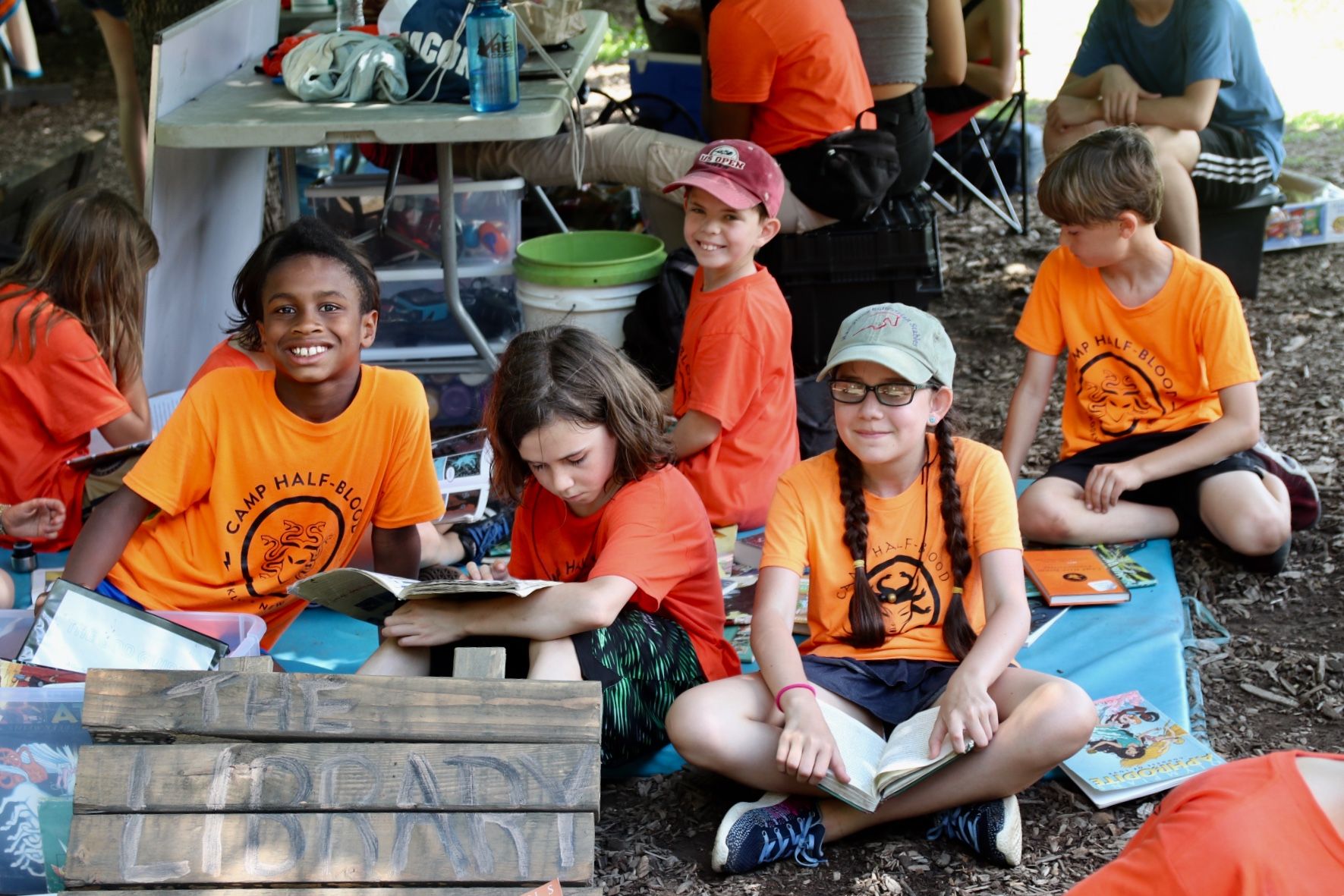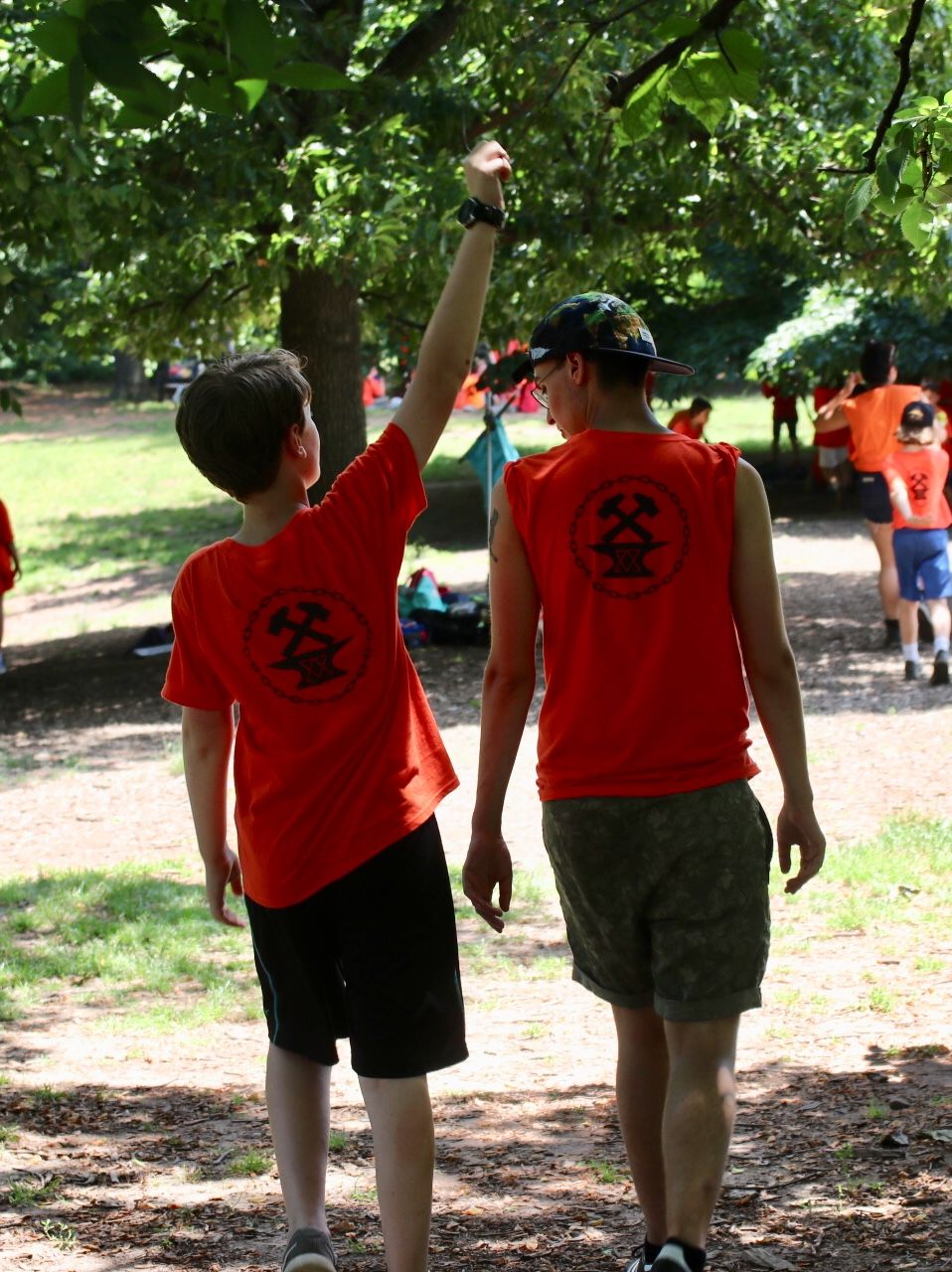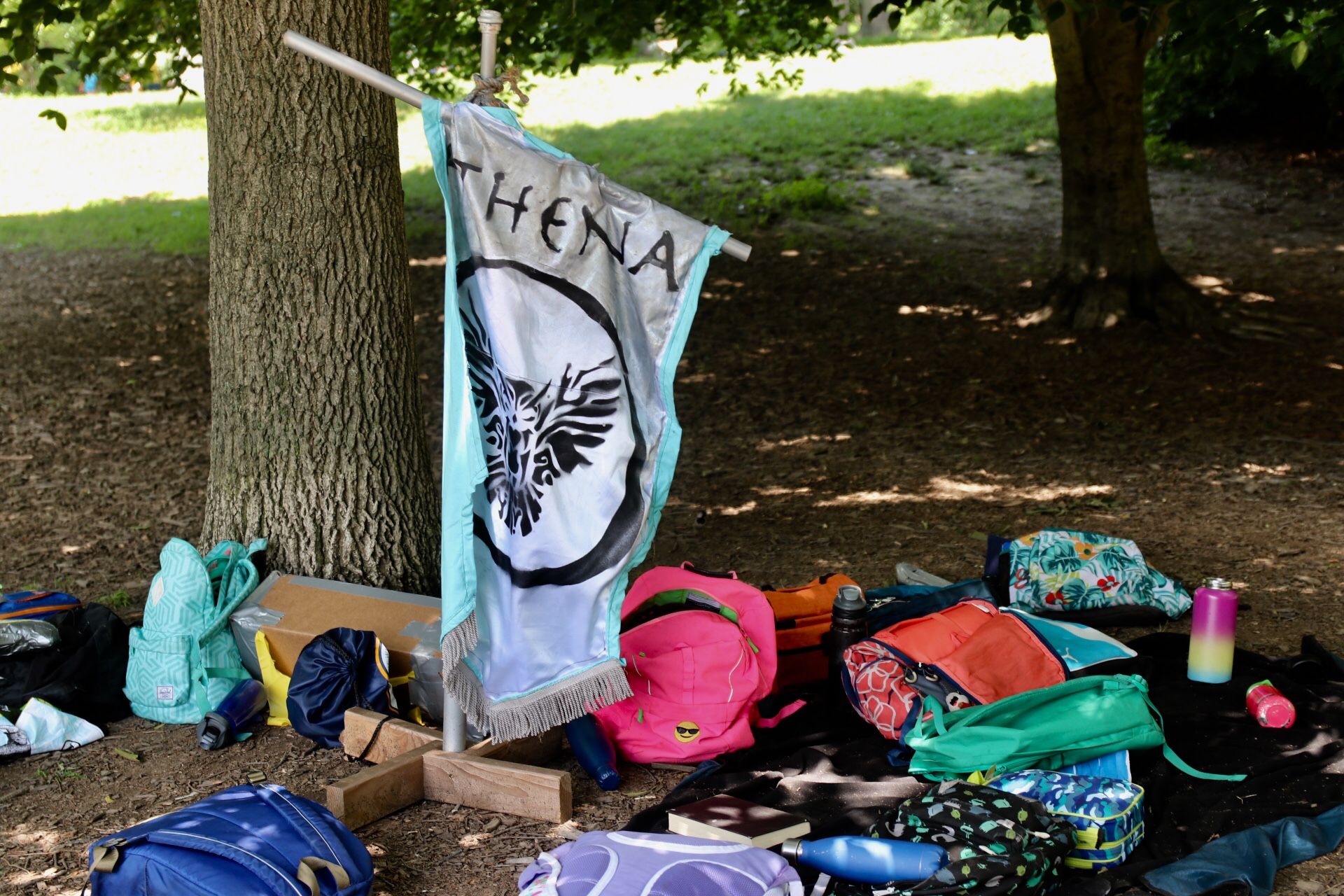“The World Needs More Heroes” — What An Actual Summer Camp Teaches Kids


PROSPECT PARK – Crystal Bobb-Semple, known as Persephone, is the founder of Camp Half-Blood, a summer camp based on the Percy Jackson books for kids who have big imaginations. We spoke on a hot summer Tuesday, both of us seated on beach chairs using the tree as a shade.
She spoke to me passionately about the kids, while they surrounded us playing with make-believe swords or sitting on the reading blanket devouring words. It was then I showed her the clip of Laura Ingraham saying immigrant children separated from their parents, being held in cages, were essentially in “summer camps.”
She paused and shook her head. “That is not summer camp. This is summer camp,” she said pointing at the swarm of kids wearing orange t-shirts that read “Camp Half-Blood.”

At camp, Bobb-Semple goes by her goddess name “Persephone,” pronounced “per-sef-ani.” In Greek mythology, Persephone is the daughter of Demeter, the goddess of the harvest. In the story of Persephone, Bobb-Semple finds her own.
As the story goes, Persephone is one day kidnapped by Hades, the god of the underworld, because he is so in love with her. He takes her to the underworld and Demeter becomes really angry. In order to get her daughter back, she threatens to stop the harvest. Zeus, being the king of gods, says that cannot happen and urges Hades to give her back. In the end, they strike a bargain: Persephone is allowed back for only half the year. And in a way, so is Bobb-Semple.
“I love summer and spring. I’m not a fan of winter and fall,” she says. “Persephone is allowed to be here for just half of the year. For me, this is the half of the year that is really special.”
“I tend to hibernate during the winters when I can,” she laughs.
Like Bobb-Semple, many of the counselors at the camp also have created their own backstories. And each one of the eight cabins is named after a god or goddess.
“The kids that come here organize themselves as children of the Greek gods,
she says. “We got children who believe they must be sons or daughters of Athena, of Apollo, of Hades, and they are basically asked to think about their own self-identity and figure out which of one of these gods’ back stories make sense for them.”
Like Percy Jackson, the young campers are referred to as demigods because “we believe they can claim their mortal heritage and also their godly heritage and combine that to help describe and define their identity in this space.”

Camp Half-Blood is “where heroes are made.” The Brooklyn flagship location is currently on its ninth camp season with over 1,000 kids (7-12-year-olds) the entire season (kids come and go every week). The camp began in 2010 when an idea sprouted in Bobb-Semple’s young reader’s book club.
Bobb-Semple owned a Bed-Stuy bookstore, Brownstone Books, for ten years. The young reader’s book club was quite popular– they read all of the newest books. One day, some kids discovered the Percy Jackson book series. “They had heard of Greek stories before, but not one had put it into a modern-day context, where this kid who’s just like them is the hero,” she says.
After a routine meeting to decide the next book for their club, the kids said they thought Camp Half-Blood (as pertained in the book) is real. And Bobb-Semple said of course it is. The kids were serious and told her to look it up. When she did, she came across a bookstore in Austin, Texas that had indeed begun an actual Camp Half-Blood. And so that’s how it all began.
Bobb-Semple so enthusiastically explains that children grow up learning about heroes in myths who have done wonderful things. But what her camp aims to teach children is that new heroes are always born — “There are always opportunities for you to become a hero.”
At Camp Half-Blood, children are engaged with the mythological stories of the past. Every summer there is an overarching story of the camp. Each week, there are adventures and lessons that lead up to the main story. They’re like chapters.
“We’re talking with kids about what it takes to be a hero,” Bobb-Semple says. “What’s that code of ethics? What’s that moment where you have to stand up and stand apart? Perhaps you find yourself in a situation where there’s a challenge that no one has been able to beat before.”
“Yeah, we use the stories of Medusa or the stories of Apollo as context for it, but there’s always going to be a moment where someone has to rise to the occasion and save the world. And so what we instill in our kids is that you are that hero or at least you can be.”
The Percy Jackson series by Rick Riordan follows a young boy in New York. Percy isn’t so great in school, often gets in trouble, suffers from dyslexia and ADHD, has a single parent mom, doesn’t have lots of friends, and “finds himself on the margins of society.”
“So you have this hero that’s not like many of the heroes we see in our typical children’s books,” Bobb-Semple says.
Being the hero doesn’t mean being the “big strong guy,” she explains. There are many different ways to be a hero. Some kids might use their intellect, other may use their social courage, or perhaps their wit to conquer. Though the camp can be pretty competitive (the different cabins compete against one another), the ways children can win are varied. For example, one of the most popular activities is sword fighting and every week there’s a sword fighting champion. But there’s also a trivia champion, and “that trivia champion is as much a hero as that sword champion,” she says.

Bobb-Semple is 47 years old, has two children (a rising senior in high school and a rising sixth grader), lives in Bed-Stuy (since 1995 with her husband), and absolutely loves to read.
“I was a voracious reader. Give me a book, give me a blanket, give me a flashlight,” she says. Though books of Greek mythology did come across her bookshelf, she wasn’t really into demigods. Because while she was a big reader, she didn’t “necessarily have an active imagination.”
“I remember reading books and daydreaming what it might be like to be courageous as some of these characters that I enjoyed, but I didn’t necessarily put myself in that story,” she says. “There was a disconnect. But what I see happening here is absolutely phenomenal and I think it happens through these types of engagements and is also a big part of a way the world works for these kids.”
As a child, Bobb-Semple wasn’t a camp girl. She was born and raised in Flatbush/Crown Heights where she also spent her summers playing outside every day. She was close to her cousins, as they lived in close proximity, and every day they would go outside and play double dutch, rollerblade, and ride their bikes, only coming back home when the sun began to set. Oh, and the library was a regular hangout place as well.
If Camp Half-Blood existed when she was a kid, Bobb-Semple can confidently say that she would have loved it. She would be sitting on the reading blanket, reading to her heart’s desire. Trivia would be her thing and she would “probably be the child of Athena.”
“I see a lot of similarities with my younger self and the way the kids in that cabin move and engage in that space,” she says. “I think it’s really great that each of our identity groups has strong allegiance. I’m really proud of the fact that we are a space for a lot of different personality types.”

Currently, Bobb-Semple is a doctoral student at the University of Pennsylvania and is writing her dissertation. Her research is on aliteracy (knowing how to read and not doing it) vs. illiteracy (not knowing how to read).
“What I’m really looking at is that once kids know how to read, how do you get them to actually do it?” she says. “My work is on developing a literacy framework for teaching reading that reflects the way we engage kids here at the camp.”
She’s always looking for ways to expand her camp and make it better. Teaching kids about the importance of diversity is one thing she’d like to include.
“In addition to engaging kids around these stories, I think it’s so important to have kids that are able to relate to other people,” she says. “We’ll explore many programs that highlight the importance of diversity and deep understanding and appreciation of other people’s cultures.”
While we were speaking on that hot summer Tuesday, kids in orange were passing by with their counselors simply having fun. With the Laura Ingraham comment in her mind, Bobb-Semple shrugged her head.
“What are we doing? Who are we as a country? Why is this happening?” she says. “Like other points in history, I talk about heroes. Who’s going to emerge? It’s not waiting for someone else. It’s who’s going to emerge to do something to stand in the space and say this is not who we are and this can’t happen here.”
“Heroes need monsters. You don’t get to rise without that monster. Try to reframe how you look at that challenge and situation and think of it as an opportunity to show your best self.”
After all, “the world needs more heroes,” Bobb-Semple says.




